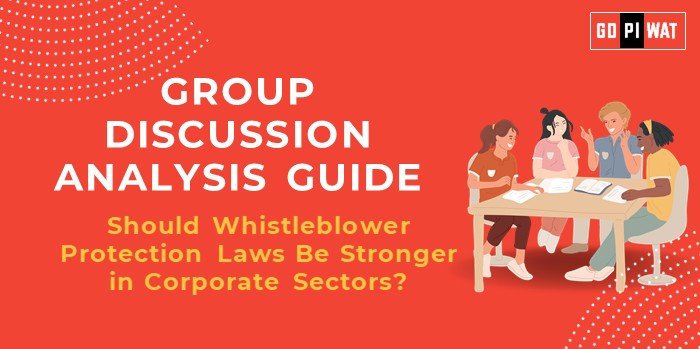📋 Group Discussion Analysis Guide: Should Whistleblower Protection Laws Be Stronger in Corporate Sectors?
🌐 Introduction to the Topic
Opening Context: Whistleblowers play a crucial role in exposing corporate malpractice, yet their protection remains inadequate in many countries. This issue is vital for B-school students as it ties directly to ethics, leadership, and organizational transparency.
Topic Background: Whistleblower protection laws aim to shield employees who report unethical or illegal activities within organizations. However, despite frameworks like the Sarbanes-Oxley Act (USA) and India’s Whistle Blowers Protection Act, 2014, retaliation and loopholes persist globally.
📊 Quick Facts and Key Statistics
- ⚠️ Retaliation Cases: Over 70% of whistleblowers in corporations face retaliation.
- 🌍 Global Coverage: Only 40% of countries have dedicated whistleblower laws.
- 💸 Corporate Losses: Companies lose 5% of revenue annually to fraud, as per the ACFE.
- 🌟 Success Example: The Panama Papers case led to significant legal reforms globally.
🤝 Stakeholders and Their Roles
- 🏛️ Government: Legislates and enforces whistleblower protection laws.
- 🏢 Corporations: Create internal whistleblowing policies and encourage ethical practices.
- 📢 NGOs: Advocate for stronger protection and support whistleblowers.
- 👩💼 Employees: Act as whistleblowers, risking career and safety for truth.
🎯 Achievements and Challenges
Achievements:
- 🔍 Corporate Transparency: Whistleblowers have exposed major frauds like Enron and Satyam.
- 📜 Legislative Progress: Introduction of whistleblower protection acts globally.
- 💡 Awareness: Growing recognition of whistleblowers as essential to corporate governance.
Challenges:
- ⚖️ Legal Loopholes: Inconsistent enforcement of protection laws.
- ⚠️ Retaliation: Dismissals, demotions, and lawsuits.
- 🌍 Cultural Stigma: Whistleblowing seen as betrayal in certain cultures.
🌍 Global Comparisons and Case Studies
- 🇺🇸 USA: Strong laws like the Dodd-Frank Act provide financial incentives for whistleblowers.
- 🇮🇳 India: Whistle Blowers Protection Act lacks robust implementation.
Case Studies:
- 📄 Edward Snowden: Highlighted global surveillance issues, raising ethical debates.
- 📊 Satyam Scandal: Whistleblower revelations led to governance reforms in India.
📌 Structured Arguments for Discussion
Supporting Stance: “Stronger laws can ensure ethical corporate culture and safeguard whistleblowers from retaliation.”
Opposing Stance: “Excessive protections may lead to misuse and hinder organizational confidentiality.”
Balanced Perspective: “While essential for transparency, whistleblower protections must balance corporate interests and individual rights.”
🗣️ Effective Discussion Approaches
- 📊 Opening Techniques:
- Start with a global example like the Panama Papers.
- Use a statistic to highlight the risks whistleblowers face.
- 🤔 Counter-Argument Handling:
- “Though misuse is a concern, strong regulations coupled with oversight can mitigate it.”
🔍 Strategic Analysis of Strengths and Weaknesses
- Strengths: Promotes transparency, builds public trust, enhances ethical corporate governance.
- Weaknesses: Potential for misuse, high implementation costs.
- Opportunities: Legislative reforms, collaboration with NGOs.
- Threats: Corporate backlash, potential for legal exploitation.
💼 Connecting with B-School Applications
- 📚 Real-World Applications: Ethics in leadership programs, case studies in corporate law and governance.
- ❓ Sample Interview Questions:
- “What measures can ensure effective whistleblower protection?”
- “How would you handle a whistleblowing case as a manager?”
Insights for Students: Understanding the importance of ethical decision-making and the role of whistleblowing in maintaining corporate integrity.


